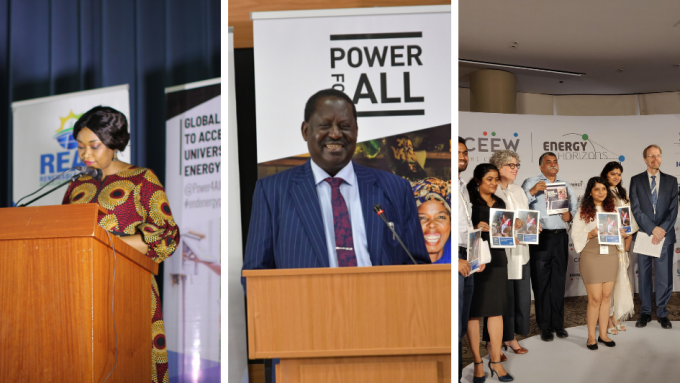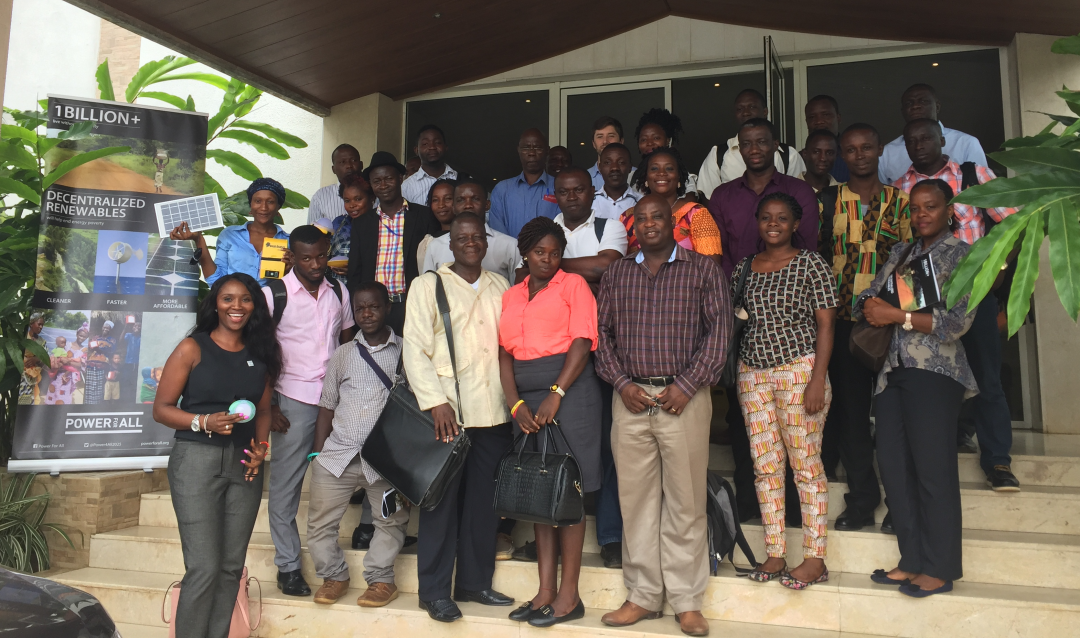Public-private engagement makes good policy—and good business—sense
Charlie, tell us a little bit about what you do now and how you were formerly involved with the Power for All campaign.
I am an energy access policy specialist, with three part-time jobs. I work with Practical Action on the Global Distributors Collective (GDC), a collective of about 140 last mile distributors across 40 countries. I also work as a senior policy advisor for the Energy Saving Trust on the Low-Energy Inclusive Appliances Programme, which promotes high-performing, high-efficiency appliances for use in off-grid and weak grid settings. Finally, I work with the World Bank Lighting Global team on off-grid solar programmes in Yemen, Uganda and DRC.
I previously served as Director of National Programmes for the Power for All campaign, which advances renewable, decentralised electrification solutions as the fastest, most cost-effective and sustainable approach to universal energy access. Power for All launched three country-level campaigns in Nigeria, Zimbabwe and Sierra Leone funded by the UK Department for International Development.
Can you tell us about the Power for All campaign and the impact it has had?
Power for All is a multi-stakeholder coalition of 300 organizations campaigning to end energy poverty by 2030. Its objective is to accelerate the growth of distributed renewable energy markets (DRE)—including both mini-grids and off-grid solutions—by creating enabling environments. The campaigns sought to build cross-sector alliances of private sector companies, government champions, aid agencies, NGOs, and investors to achieve systemic change within these countries. The results were different in each country.
Sierra Leone is a small country with fewer stakeholders, which makes it a perfect place to run a campaign like this. We helped to develop Sierra Leone’s ‘Energy Africa Compact’, a bilateral agreement between the Governments of the UK and Sierra Leone to implement a package of policy reforms, including off-grid solar tax exemptions. Then we supported implementation of those reforms. We helped to set up the Renewable Energy Association of Sierra Leone, which is still operating and well-recognised as the voice of the private sector on these issues. And we developed and coordinated a rural electrification task force, a formal mechanism through which government agencies (energy, finance, customs, standards), the industry association, donors, financial entities and civil society could identify barriers to market growth, remove those barriers and inform supportive policies and programmes.

In Zimbabwe, again we helped to strengthen the Renewable Energy Association in Zimbabwe. We worked a lot with civil society, an important stakeholder in Zimbabwe, and set up a potent alliance of private sector and civil society organizations to support DRE. Even after the campaign there formally ended, the momentum we had built helped to persuade the government to eventually start taking off-grid solutions seriously. They subsequently introduced a tax exemption, which has been very important in helping DRE companies grow.
In Nigeria, which is a huge country and a challenging place to operate, we worked again mainly with the private sector, but also with faith groups and NGOs. We helped to set up the Renewable Energy Association of Nigeria (REAN), which like in Sierra Leone, effectively represents private sector interests today. We helped to secure the Rural Electrification Agency’s commitment to DRE, with the Permanent Secretary announcing a new NGN 2 billion fund for rural electrification to implement the country’s electrification strategy at our event and agreeing to work with REAN on tenders and procurement. Power for All eventually set up a DRE task force in Nigeria as well and continues to play a major role in the country’s ambitious electrification programme.
In all three countries, the awareness-raising and technical support to different stakeholders was reinforced by a media campaign. We were also able to change the volume and tone of the media coverage of the DRE sector in both Zimbabwe and Sierra Leone—positive media coverage of the DRE sector went up 26x in Zimbabwe and 11x in Sierra Leone. The campaigns, which were only 18 months long, culminated in Calls to Action where all stakeholders, including the government, made commitments to take action in support of accelerating DRE market growth in future.
Much of the work we did was foundational. It was about raising the awareness of different stakeholders and establishing mechanisms through which they could collaborate more effectively. This then helped the private sector get into a position where it was able to create and maintain its own enabling environment. Without these process outcomes, like the establishment of task forces, policy reforms are fragile, and are unlikely to be sustained.
Why did you decide to take the approach you did, as compared to spending the money on policy roundtables, or other things?
Countries are often a confusing mix of different donors, different agencies, and other actors all working on their own programmes. Collaboration, if it exists, is often ad hoc. Campaigns are ideal for breaking down silos between stakeholders and mobilising those stakeholders—in a sustained way—toward targeted policy goals and outcomes. Another reason is that campaigns are, relatively speaking, affordable ways of supporting markets. Power for All’s 18-month campaigns, for example, didn't cost more than £150k to £200k in each country. I think the reason why people are nervous to support this kind of work is because it's difficult. It's not easy to measure impact. It’s often hard to attribute results. And for those reasons, I think policy work is still relatively under-supported by donors because they prefer things that can be counted more easily.
In terms of its value, the results speak for themselves. In Sierra Leone, there were 2,000 sales in the six-month period before the campaign started, and 20,000 in the final six months of the campaign. And with the lights 20% more affordable because of the tax exemption we helped to implement, the sales continued to grow after the campaign ended. If you can achieve a meaningfully implemented policy reform, the impact on market growth can be profound.
Too often, consultants are brought in to have a series of conversations, write some recommendations, and put a report on the Minister’s desk saying, "Here's what you should do.” This approach has been failing because of very low levels of buy-in and ownership from government and other stakeholders. I think there's research from the broader international development sector, which shows that governments are far more likely to listen to the recommendations of a report if they themselves have been involved in the design of the study, the collection of the data, the analysis, and the preparation of the recommendations.
We always wanted a very embedded process, which we knew would take longer, but that would involve the right people, having the right conversations and learning the right things; the ‘messenger’ is as important as the message itself. We focused a lot on strengthening peer to peer relationships, so that people in Nigeria, Zimbabwe or Sierra Leone could hear how other countries had handled the issues they were grappling with, and what the results had been.
Stepping back and looking at the broader picture again, what is the significance of policy agendas, rules, and regulations for inclusive businesses? To play devil’s advocate, shouldn’t entrepreneurs be able to just run with their ideas? Why do they need those policies?
I would argue that policy and regulation remain an under-recognised part of the business ecosystem. The off-grid solar sector has historically tried to operate a bit ‘under the radar,’ which comes with big risks. In 2015, when the East African Community realised that a tax exemption for solar equipment was being used to bring in solar home systems that included appliances like TVs, and components like batteries that could be used for other purposes, they were very quick to end the tax exemption, which led to a reduction in the growth rate of off-grid solar markets in the region. The industry is trying to find ways to reinstate those tax reductions, with limited success.
But as a result, industry and government have started engaging in much more meaningful dialogue. I think many on the private sector side recognise that tax exemptions are difficult for governments to support and are now keen to explore other ways that governments can support the off-grid solar sector through, for example, results-based financing or concessional financing.
There are some positive examples of the private sector partnering with government these days. For example, in Togo the introduction of a new licensing scheme, whereby international companies are allowed in and given a tax break in exchange for agreeing to share data has enabled BBOXX and others to sell a lot of systems. That's been a tremendously successful partnership, it’s unlikely a company of BBOXX’s size would have gone to a small West African country like Togo, were it not for the policy environment that the government created.
I still think some companies need convincing of the value of engaging in policy discussions, because their instinct is to stay away from government. But good policy can make a market viable where previously it was not. We have work to do to get international companies to see the value of taking part in national industry associations, working with local companies, and investing time in creating a clear industry voice. Companies need to work together to create their own enabling environment, rather than relying on others to do it for them.
What are some suggestions you have to make public-private dialogue more effective and impactful?
The first thing I would highlight is the importance of working behind the scenes with each stakeholder group, before entering into dialogue. Companies, when they talk to governments, can sometimes be too prescriptive and unwilling to compromise, and they do not necessarily see the issues from the perspective of their counterpart. Dialogue can quickly break down because of a perceived lack of trust, or lack of respect for each other’s point of view.
So, you must work with stakeholders beforehand to ensure they have the knowledge, skills and capacity they need to engage constructively. You need to ensure there’s a clear incentive for them to engage with their counterparts, and a clear objective that they're seeking to achieve, as well as clarified parameters about what's non-negotiable, and what can be compromised on. All of this is vital, or you risk doing more harm than good.
Another thing I would highlight is the importance of top-level political support for public-private dialogue. To be effective, you need permanent mechanisms through which the public and private sectors can work together. And those permanent mechanisms need to be endorsed by the very top level of government. Prime Ministers and Ministers need to say, "That task force is vital. It's the conduit through which we talk to the private sector about off-grid solar solutions, which is an integral part of our energy strategy, and we recognise that." This is crucial to getting the support of the senior and mid-level civil servants that have a decisive role in determining whether a policy reform gets meaningfully implemented or whether it just sits on the shelf.
Is there anything else you would like to add?
Power for All is continuing its market activation work through its 25 x 25 collaboration. Check it out!
Charlie, thank you for providing your insight into how important policy engagement is for inclusive businesses, through the Power for All campaign and beyond.
